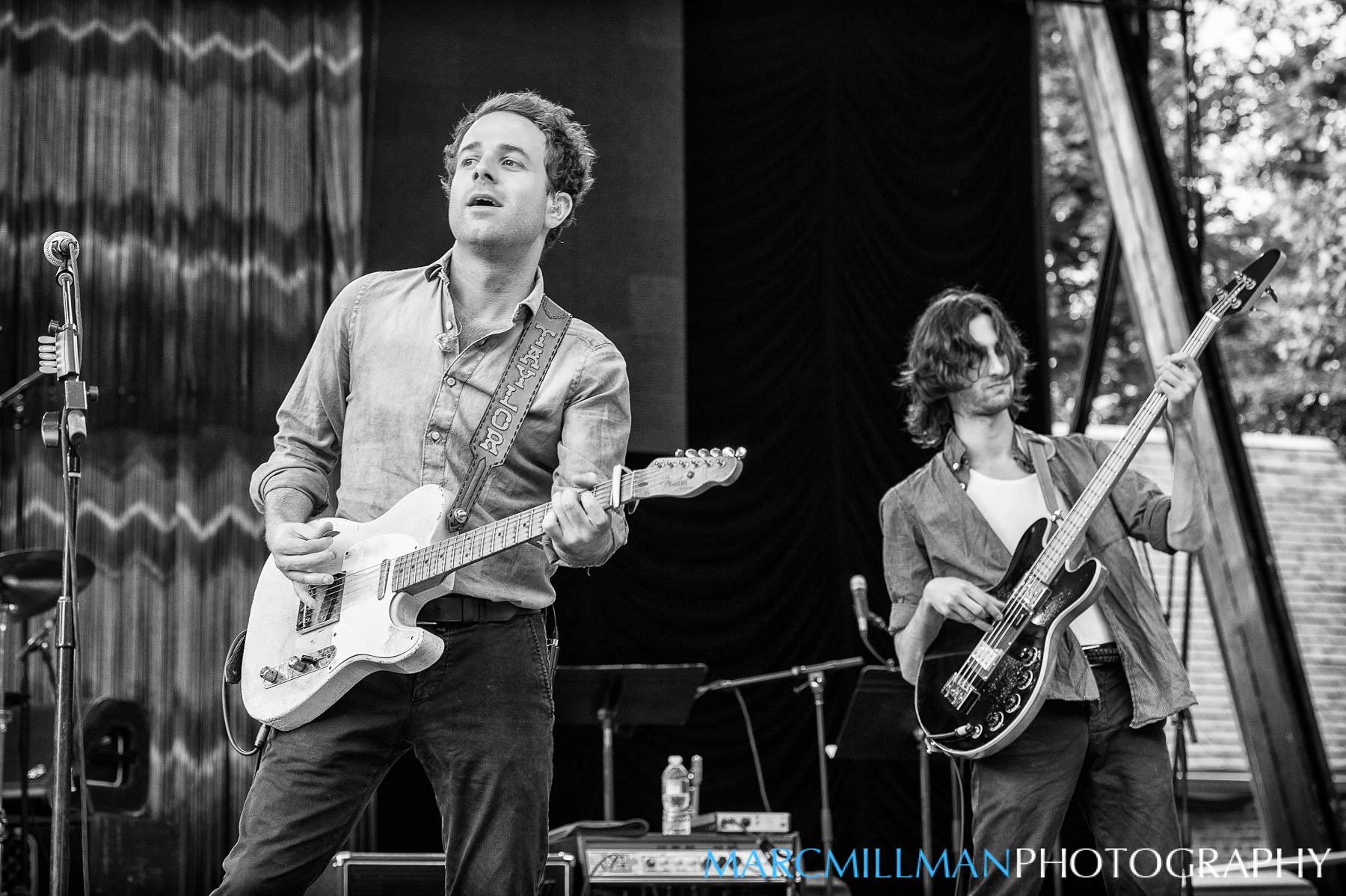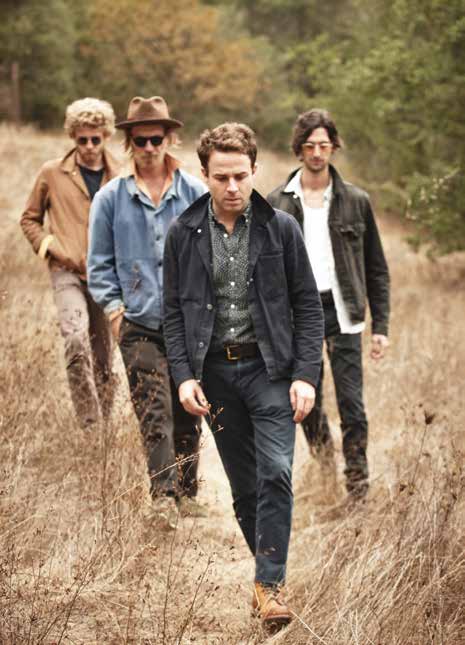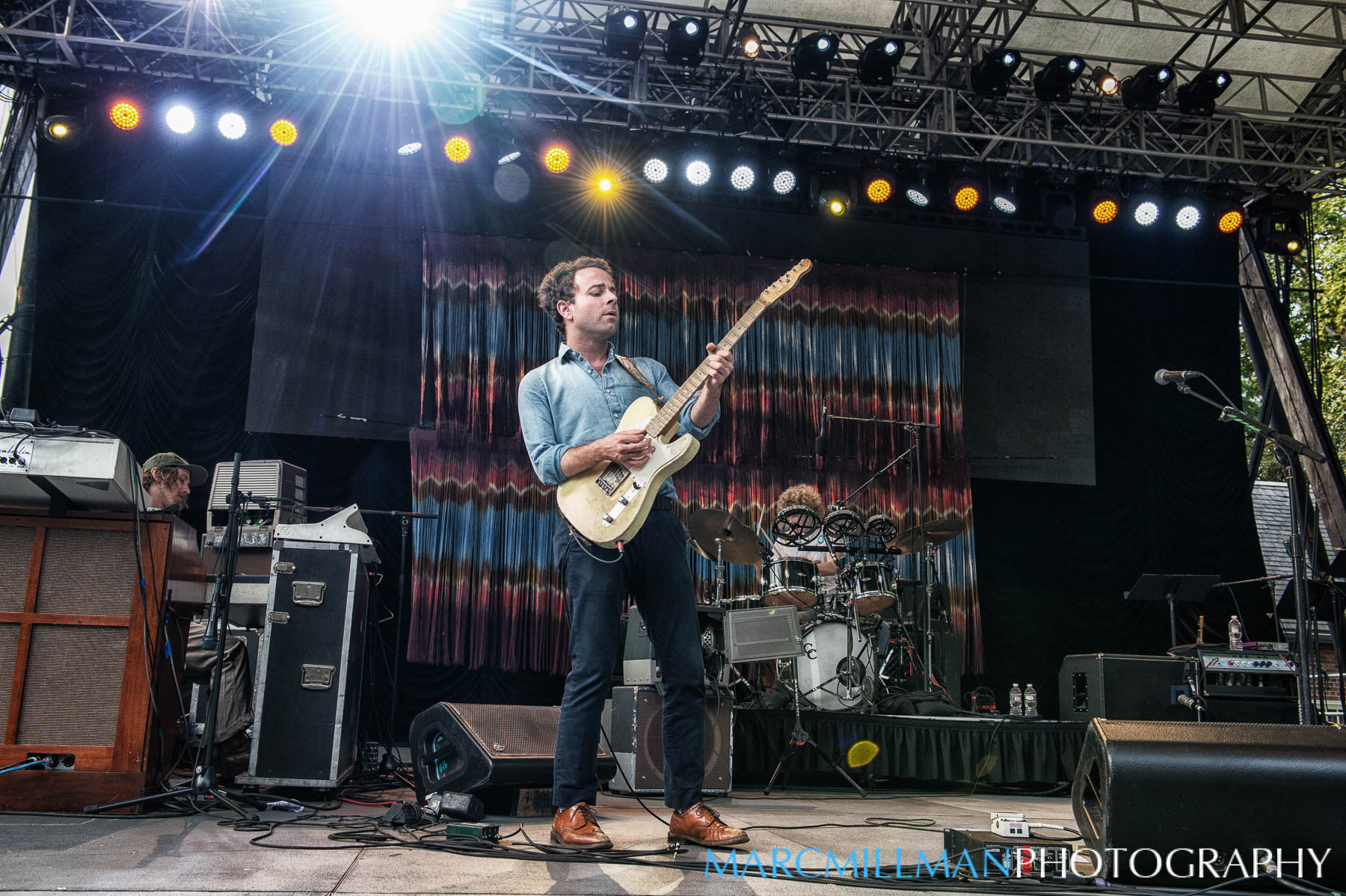Dawes: The Song Remains the Same

Taylor Goldsmith lives in a house that can best be described as “quaint” and worst as “small,” on a cul-de-sac in a rapidly gentrifying section of LA. It’s the kind of neigh- borhood where you’re as likely to see streetside taco stands as you are dual-seat strollers.
“Once one area gets too expensive, all of the artists that don’t make the kind of money you need to live in most areas in LA need a place to go,” he says of the hood he’s been living in for the past two years. “I have a lot of friends out in this area; we have our favorite spots and it’s really starting to feel like a proper home.”
When I walk into the house, before I take in the whole thing—which takes all of about two minutes—I ask if it’s just him that lives there, or his whole band. He laughs. “The whole band in here would be an interesting experiment.”
Goldsmith is the singer-songwriter of Dawes, a group I’ve spent a lot of time with as an audience member, a fan and an interviewer; when I come to the door, he greets me with a large hug, and it’s clear that it’s not perfunctory. He yells for the rest of the band to come in from outside and join us on the couch in his compact living room, where we’re surrounded by books (I see Kerouac and a full bookshelf of what can only either be encyclopedias or special-editions) and DVDs (a season of Friday Night Lights—a gift from manager Peter Mensch, whose last name clearly describes his personality—sits atop the piano against a wall).
The band’s latest record, All Your Favorite Bands, much like the three Dawes albums that have preceded it, is full of smart-kid lyrics and Topanga Canyon harmonies. Over the better part of the hour that follows, Taylor’s clearly the spokesman for the group as well as their frontman— for most of the interview, he speaks confidently for the band. The other three full-time members—bassist Wylie Gelber, keyboardist Tay Strathairn and Taylor’s brother Griffin—spend most of the hour in various stages of nodding; that is, when Griffin’s dog, Reseda, isn’t busy climbing on couches, whining outside or playfully, repeatedly biting at me.
Though All Your Favorite Bands doesn’t stray far from the airy, timeless soft-rock- meets-heartfelt-similes sound where Dawes has found safe haven since their debut, 2009’s North Hills, the new album—which was recorded live in the studio with legendary producer David Rawlings (Gillian Welch, Ryan Adams)—finally finds them all keyed into that unified feel, rather than running from it.
“I think the more we get comfortable with who we are as players—and me as a songwriter—the more we can accept that this is our sound and then work accordingly, rather than continue to try to form what our sound is or what our style is,” Taylor says at the start of our chat.
The other members agree. “At this point, I feel like we’re all used to hearing [and contributing to] a song that Taylor would write,” Strathairn says in one of his few interjections. “I hear one of Taylor’s songs and I’m like, ‘Oh, this is normally where I play music—in between these two places.’”

Some groups would see that sort of comfort as a reason to run in the opposite direction. (For proof, listen to the newest Mumford & Sons record.) And it’s not as if the band’s listening regimen is limited to familiar touchpoints like The Band (who Dawes covered for an entire show a couple years ago) and Neil Young: When they were recording the album, they were finding inspiration in everything from indie hip- hopper Earl Sweatshirt to psych-rocker Benji Hughes.
But Taylor actually finds the most inspiration within his normal confines. “The more you set up those sonic boundaries and limitations, the more results you get,” he says. “When there’s no structure in place, I don’t know what to say—but I feel like knowing what we do, what we do together and the specifics of that, inspires us more than anything else—even though it might sound like we wouldn’t be.”
They recorded the album in Rawlings’ home studio in Nashville, at a time when the Tennessee city has gained a reputation as the new home of rock. Taylor explains that Dawes found the right kind of driving force there: “Nashville is a special place and it seems to be right in the middle of a special time, at least that’s the impression we get from the friends out there that we’ve made. There seems to be a counter- culture to all of the processed pop/country songwriting that people might associate with it. It’s really inspiring to be in the midst of really talented people doing it for all the right reasons as far as I’m concerned.”
The band’s all-as-one mentality has unquestionably made its way onto the record in songs like the heartfelt title track and the lovely “To Be Completely Honest,” thanks to Rawlings’ unusual hands-off approach. The producer would roll tape each day and the band would record everything completely live on two-inch analog tape—a methodology that, by design, makes records notoriously hard to edit, since there’s not the possibility of fixing something on a computer if it’s not quite perfect. But he didn’t stop there: The band actually never got a chance to listen back until those edits were done, which in essence meant they couldn’t be changed at all along the way.
“We didn’t get caught up in the subtleties, particulars and details in a way we shouldn’t,” Taylor says. “By knowing we weren’t going to hear all these things, it allowed us to play more freely and not be caught up in what gets saved and what gets cut. We were just rolling. And that was a really good thing for the band.”
If you’re thinking that it sounds like there was more room for improvisation, then you’d be right; some of the songs
not only feature off-the-cuff solos but also entire sections that were unplanned. (For more on this, check out our extensive side- bar commentary on the nearly 10-minute “Now That It’s Too Late, Maria.”)
“When I listen to the instrumental sections on the record, they feel like band solos, almost,” Taylor observes, and he’s not exaggerating. “That’s been a characteristic of bands we’ve always loved—like the Grateful Dead or The Rolling Stones or The Band, and so many others. [We didn’t use to improvise] but we totally do now. All those instrumental moments—it was like, ‘OK, we’re just gonna kind of roll, and hopefully something cool will happen.’”

Obviously, that approach isn’t limited to the studio: Though the band has certainly headlined runs before, they’ve spent much of the last few years building an audience through shorter opening sets for legendary acts like Jackson Browne and on the festival circuit. This year, though, they’re planning a far more expansive stage show—which includes bringing on a powerhouse player to fill in some gaps on guitar. For the first time, they’ll be touring with Duane Betts, a childhood friend whose last name is familiar to anyone with even a passive interest in the most classic of rock.
“Recently, we realized he was back [in LA] and not really touring with his dad,” Taylor says of Duane, the son of Allman Brothers guitarist Dickey Betts. “For a long time, we’ve been wanting to find a fifth guy. The idea that just some auxiliary guy would strum along while we do the rest didn’t feel right. If we’re going to add someone to the band, let’s have someone with a voice— with a personality that we can pick up on. We took him out to two shows to see how that felt, and they were two of our favorite shows we ever played. It’s going to allow us to be bigger and better for obvious reasons—and to play a lot longer. When it was the four of us, with the same guy singing and playing lead guitar, after two hours, you’re like, ‘OK, I’ve got it.’ But we just did a show [with Duane] in Savannah, Ga., where we played for two and a half hours—and we easily could go another hour. He’s very lyrical and very fluid. He sounds like a soul singer who’s out on a ledge—and you don’t know if he can get back on.”
This addition only reinforces what Dawes have proven with All Your Favorite Bands, which is that they’re willing to take major chances, even as they remain in a familiar space.
“We try to make steps that would help us get to the next level and in front of more people,” Taylor says. “It’s been a steady growth for us from the beginning—and we’re so grateful for that. We’ve always felt that the longer it takes a fan to commit to you, the longer they’re gonna be willing to stick around, so we’re not in any rush to make something happen overnight.”



















